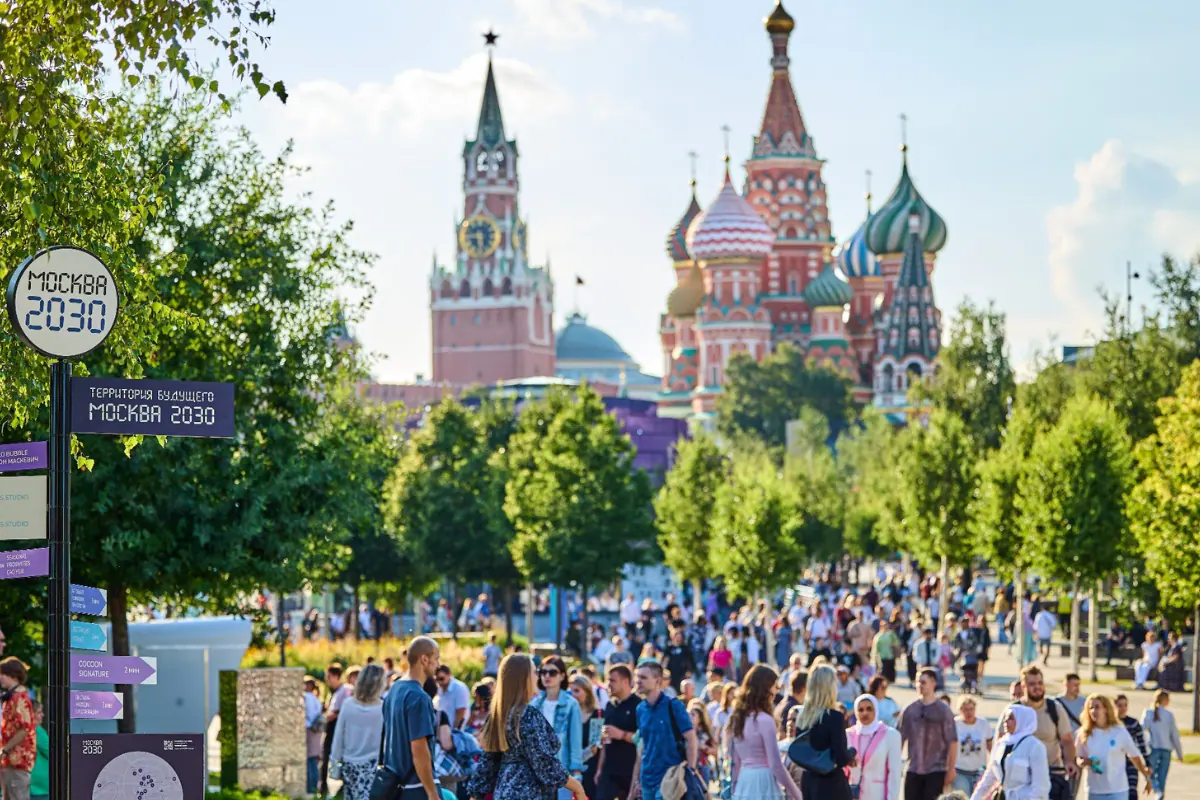Oct 21,2024

In recent years, Moscow has reestablished itself as a major destination for international tourists, with the city attracting 2.3 million foreign visitors in 2023. Tourists primarily hailed from countries such as China, Turkey, India, and Iran, with notable increases from the UAE, Qatar, and Kuwait, surpassing pre-pandemic numbers. Early data from 2024 suggests an even more promising year for tourism, with nearly half a million foreigners visiting the Russian capital in just the first quarter, marking a 40% increase from the previous year.
Tourists are increasingly drawn to Moscow not only for its iconic landmarks—like the Kremlin, St. Basil’s Cathedral, and the renowned Tretyakov Gallery—but also for the rich cultural and entertainment experiences the city offers. With its grand festivals, vibrant arts scene, and historic streets lined with elegant mansions from the 18th and 19th centuries, Moscow provides a blend of tradition and modernity that captivates both first-time visitors and returning travelers.
Festivals and Cultural Tourism: A New Focus for Moscow
One of the key factors contributing to Moscow’s growing appeal is the rise of event-based tourism. According to Evgeny Kozlov, Chairman of the Moscow City Tourism Committee, developing the city’s event tourism sector is a top priority for the coming years. By 2030, it is projected that 14% of all tourists—approximately 7.3 million people—will visit Moscow specifically to attend its cultural festivals, fairs, and large-scale events.
Evgeniya Sumina, head of special projects at the Project Office for the Development of Tourism and Hospitality in Moscow, underscores that many travelers are drawn to the city for its festivals, where they can enjoy fresh and diverse experiences. These events provide a unique lens through which to explore Moscow, offering vibrant, unforgettable moments that keep tourists coming back for more. “Impressions are the capital’s resource,” Sumina explains, highlighting the importance of these experiences not just for visitors, but also for residents rediscovering their city.
A Growing Portfolio of Cultural Events
One of the most remarkable events in Moscow’s recent history is the International Exhibition Forum “Russia,” which captivated millions over an eight-month run at VDNKh. Featuring interactive exhibits from all 89 regions of Russia, the forum allowed visitors to immerse themselves in the cultural diversity and achievements of the entire country. Drawing over 18.5 million visitors, it significantly boosted Moscow’s tourist numbers.
Similarly, the summer festival “Territory of the Future. Moscow 2030,” held across 30 venues, showcased the city’s forward-looking strategy with cultural, sports, and educational events. The festival culminated in a spectacular celebration for Moscow’s City Day, further cementing the capital’s status as a hub for large-scale events. Meanwhile, the “Summer in Moscow. Let’s Hit the Streets!” festival, spanning 100 days, invited visitors to participate in activities ranging from yoga and ping pong to art workshops and space exploration discussions. A distinctive feature of the festival was its community-driven agenda—25% of the 25,000 events were organized by local residents, businesses, or NGOs, making it a true reflection of Moscow’s vibrant civic life.

Another standout event is the “Moscow Estates” festival, which offers a unique journey through Moscow’s history via more than 2,500 events hosted in 40 historic estates. Visitors can engage in interactive exhibits, enjoy historical picnics, and attend operatic performances by leading Russian artists, all set against the luxurious backdrops of these storied estates. The festival, free to both locals and tourists, stands out for its scale, diversity, and immersive storytelling.
Winter Festivals: A New Draw for Year-Round Tourism
Although summer has traditionally been the peak tourist season in Moscow, the city’s winter offerings are attracting more visitors each year. One of the main highlights is the “Journey to Christmas” festival, which transforms the streets into a winter wonderland with theatrical and musical performances, creative workshops, and traditional Russian cuisine. The festive atmosphere makes Moscow an increasingly popular winter destination for those looking to experience its magical holiday charm.

The “Moscow Tea Time” festival also provides a fascinating glimpse into Moscow’s evolving tea culture. Held at central venues, including restaurants and hotels, the festival revives historic tea traditions, allowing visitors to sample Moscow tea blends, pastries, and even experience a traditional samovar tea ceremony. This event showcases the city’s hospitality and offers a unique gastronomic experience that adds to Moscow’s appeal as a destination for food lovers.

Additionally, the celebration of the Chinese New Year in February 2024 marked a new milestone in Moscow’s event calendar. More than 300 events took place across the city’s main cultural hubs, featuring Chinese acrobats, martial arts demonstrations, folk music concerts, and calligraphy workshops. The festival was an opportunity for visitors to explore Chinese culture while celebrating the New Year in one of Moscow’s most festive settings.
The Future of Moscow’s Event Tourism
Moscow’s event calendar continues to expand, with popular festivals such as “Easter Gift” and “Moscow Spring” filling the off-season months. Each year, these events grow in size and scope, supported by both the city’s authorities and the tourism industry. New initiatives and innovative formats are being introduced, further enriching the city’s vibrant cultural landscape.
As Moscow continues to invest in its festival scene, it’s clear that event tourism will play a central role in shaping the city’s future. With a diverse range of cultural, gastronomic, and artistic experiences available year-round, Moscow is not only redefining itself as a tourist destination but also reshaping the way people engage with the city.

For both residents and visitors, Moscow’s festivals offer more than just entertainment—they are a gateway to the city’s soul, blending tradition with innovation, and leaving lasting impressions that invite tourists to return again and again.
.svg)
